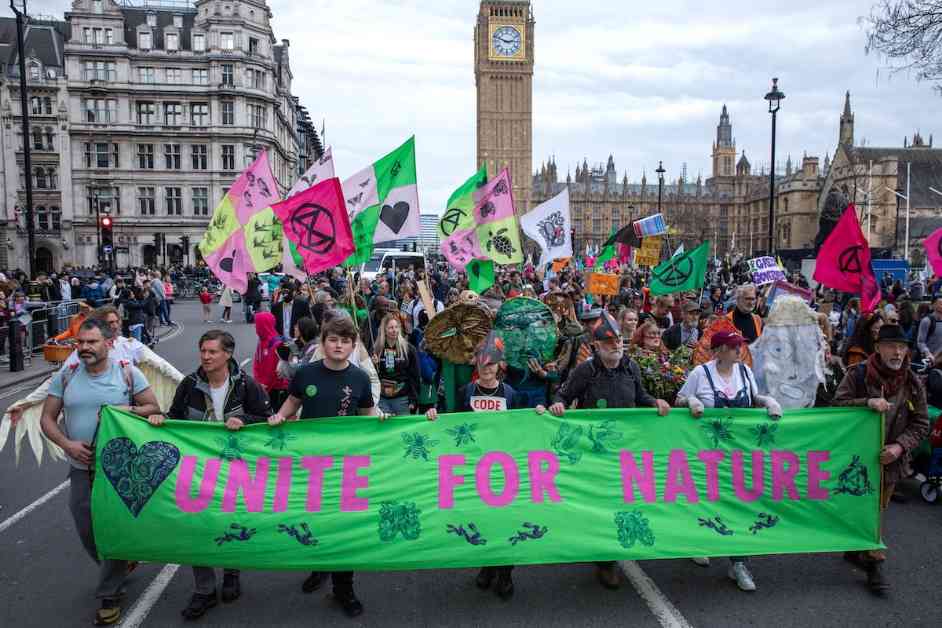Tens of thousands of climate activists take part in a Biodiversity March to mark Earth Day in London, UK on April 22, 2023. Mark Kerrison / In Pictures via Getty Images
A whopping 89 percent of people globally want stronger action on the climate crisis, but feel trapped in a “spiral of silence” because of the mistaken belief they are in the minority, according to research. Experts say making people with pro-climate viewpoints aware that they are in the majority could unleash a social tipping point that could drive leaders to take necessary climate action, reported The Guardian. “One of the most powerful forms of climate communication is just telling people that a majority of other people think climate change is happening, human-caused, a serious problem and a priority for action,” said Anthony Leiserowitz, a professor of climate communication at Yale School of the Environment, as The Guardian reported. The data was the result of a worldwide survey of 130,000 people from 125 nations that found 89 percent believe their country’s government “should do more to fight global warming.” “Currently, worrying about climate change is something people are largely doing in the privacy of their own minds – we are locked in a self-fulfilling spiral of silence,” said Cynthia Frantz, a professor of psychology and environmental studies at Oberlin College. The Guardian has launched a collaborative reporting project with dozens of newsrooms all over the world — including Covering Climate Now (CCNow) and Agence France-Presse — called The 89 Percent Project to highlight the fact that most people want stronger climate action. The collaboration builds on recent scientific studies that have found that from 80 to 90 percent of the global population support stronger measures to tackle the climate crisis. However, this overwhelming majority believes their fellow citizens don’t share their views. “If you were to unlock the perception gaps, that could move us closer to a social tipping point amongst the public on climate issues,” said Dr. Niall McLoughlin with the United Kingdom’s Climate Barometer research group, as reported by The Guardian. Experts say breaking this “spiral of silence” could spur greater climate action. “If, in fact, a majority of people in your community care about climate change, and yet elected officials aren’t responding to that, that’s a deficit in democracy,” Kyle Pope, co-founder of CCNow, told Common Dreams. The 89 Percent Project is a yearlong initiative that starts this week to coincide with Earth Day. Its next joint week of journalism coverage will precede the COP30 United Nations Climate Conference this fall in Belém, Brazil. Between those events, CCNow will be hosting gatherings and webinars and analyzing climate news to find out what is being covered and what support news organizations may need with climate reporting in the future. The Guardian’s analysis of the data showed that there was as much public support for climate action in G20 countries like the United States, Saudi Arabia and China as in other nations. G20 member countries are responsible for more than three-quarters of the world’s carbon emissions. “The world is united in its judgment about climate change and the need to act. Our results suggest a concerted effort to correct these misperceptions could be powerful intervention, yielding large, positive effects,” said Teodora Boneva, a University of Bonn professor who was on the 125-nation survey team, as The Guardian reported. The 125 countries that were part of the survey produce 96 percent of the planet’s carbon emissions. People living in China, the biggest polluter in the world, expressed the most concern, with 97 percent saying the government needed to do more to tackle climate change and 80 percent saying they would donate one percent of their income to support the efforts. In the U.S., the second biggest polluter, 74 percent said the government should do more, with 48 percent willing to give part of their income. “People deeply understand we are in a climate emergency,” said Cassie Flynn, global director of climate change at the UN Development Programme, which conducted the 2024 People’s Climate Vote, as reported by The Guardian. “They want world leaders to be bold, because they are living it day to day. World leaders should look at this data as a resounding call for them to rise to the challenge.”














